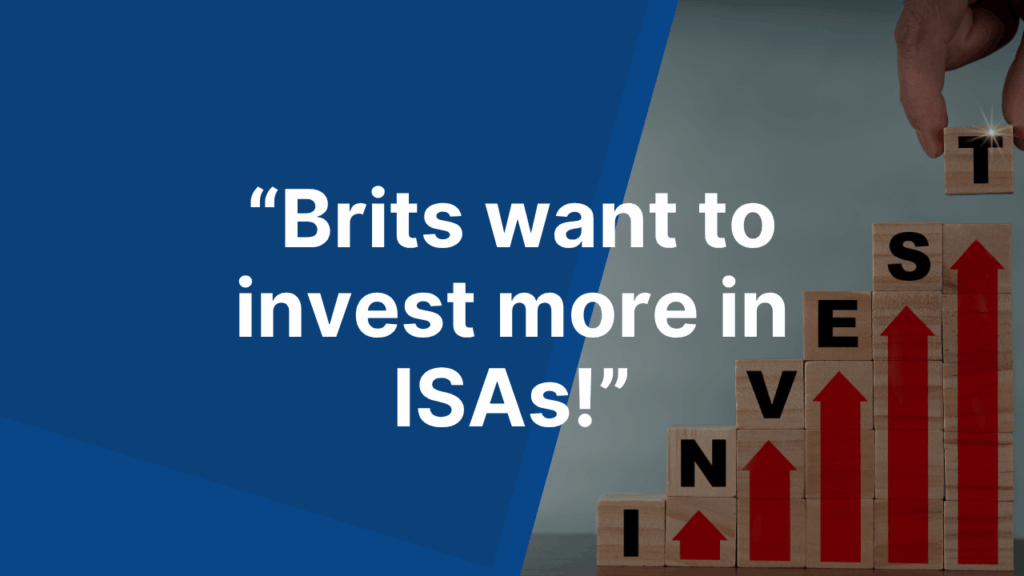Our latest Good Money Guide Survey reveals that while UK savers increasingly recognise the benefits of investing, with most expressing a willingness to take on some risk. However, many still allocate a significant portion of their savings to the perceived safety of Cash ISAs, even as inflation and falling rates erode real returns.
Savers Still Playing It Safe
On average, respondents said they would be comfortable putting £9,897 of a hypothetical £20,000 into a Cash ISA, despite many indicating a moderate to high tolerance for investment risk. When asked about their approach to risk:
- 69% said they’re willing to take some risk for better returns.
- Only 22% said they prefer to earn less but sleep better.
- 7% admitted they don’t trust the markets.
- 3% felt they lacked the knowledge to decide.
This reveals a potential “intention-action gap,” where savers express willingness to take on investment risk but remain anchored to cash-based strategies.
A Generational Opportunity, Being Missed?
The survey asked whether respondents regretted not investing in stocks instead of saving in cash:
- 38% said they sometimes regretted it but valued peace of mind.
- 30% said they’ve missed out on significant gains.
- 20% were happy with guaranteed access to funds.
- 12% had never even considered the question.
This suggests nearly 7 in 10 savers have had at least some regret over not investing — even though most are still staying on the sidelines.
Men More Willing to Invest, Women Prefer Holding Cash
The survey revealed that men are significantly more likely to embrace investment risk, with 72% saying they’re willing to take some risk for better returns, compared to just 47% of women. Male respondents also allocated less to Cash ISAs on average — £9,624 versus £11,528 for women — suggesting a greater appetite for market-based returns. Interestingly, men were also slightly more likely to regret not investing, with 28% admitting to missing out on big gains versus 26% of women.
Conversely, women showed a stronger preference for holding savings in cash, potentially reflecting a more cautious approach to financial decision-making. Despite being less likely to take investment risk, their regret over not investing was only marginally lower than men’s, indicating that some may be risk-averse in practice but still conscious of missed opportunities. These findings suggest a gender gap in financial confidence or access to investing tools — and highlight the need for tailored education to help both men and women better align their financial behaviour with their long-term goals.
Areas most likely to invest
The regions showing the strongest interest in investing were Middlesex, Down, Nottinghamshire, Ross and Cromarty, and the Isle of Wight — where 100% of respondents said they were willing to take some risk for better returns. While attitudes were consistently pro-investment across these areas, the average amounts people were comfortable keeping in Cash ISAs varied widely — from just over £5,000 in Middlesex and Ross and Cromarty to a full £20,000 in the Isle of Wight. This suggests that even among those open to investing, many still value a solid cash buffer.
Areas where people prefer saving cash
In contrast, the regions most focused on cash savings — with an average Cash ISA allocation of £20,000 and 0% risk tolerance — were Leicester, Derbyshire, Perthshire, Cardiganshire, and Pembrokeshire. Respondents in these areas demonstrated no appetite for investment risk and instead showed a strong preference for keeping their entire savings in cash. These findings highlight a significant regional divide in financial confidence and investment readiness across the UK.
Why People Prefer Cash
Participants could select multiple reasons why they believe people in the UK favour cash over investing. The most cited reasons were:
- 71% – Fear of losing money
- 45% – Lack of financial education
- 26% – Short-term financial needs
- 21% – Cultural preference for caution
- 17% – Negative media coverage of markets
Fear and education clearly outweigh performance considerations — even in an era of easy access to investing tools.
What Happens if Rates Fall Below 2%?
With rates on new fixed ISAs dropping in May to an average of 3.92%, the survey also tested rate sensitivity. If ISA rates were to fall below 2%:
- 70% would look elsewhere for better returns
- 18.5% would stay put for safety
- 7% said they were unsure
- 5% said it might prompt them to invest for the first time
This shows a tipping point could be approaching — one that investment providers might capitalise on with clearer education and onboarding.
Our view
Richard Berry, founder of Good Money Guide, commented:
“The sharp reduction in the Cash ISA allowance makes it essential for savers to reassess how and where they grow their money. Sitting in cash might feel safe, but over the long run, it’s risky — especially when inflation and lower interest rates erode your real returns. If we want to build a culture of long-term wealth creation, we need to move past fear and start investing with confidence.”

Richard is the founder of the Good Money Guide (formerly Good Broker Guide), one of the original investment comparison sites established in 2015. With a career spanning two decades as a broker, he brings extensive expertise and knowledge to the financial landscape.
Having worked as a broker at Investors Intelligence and a multi-asset derivatives broker at MF Global (Man Financial), Richard has acquired substantial experience in the industry. His career began as a private client stockbroker at Walker Crips and Phillip Securities (now King and Shaxson), following internships on the NYMEX oil trading floor in New York and London IPE in 2001 and 2000.
Richard’s contributions and expertise have been recognized by respected publications such as The Sunday Times, BusinessInsider, Yahoo Finance, BusinessNews.org.uk, Master Investor, Wealth Briefing, iNews, and The FT, among many others.
Under Richard’s leadership, the Good Money Guide has evolved into a valuable destination for comprehensive information and expert guidance, specialising in trading, investment, and currency exchange. His commitment to delivering high-quality insights has solidified the Good Money Guide’s standing as a well-respected resource for both customers and industry colleagues.
To contact Richard, please ask a question in our financial discussion forum.




